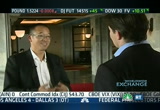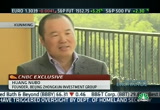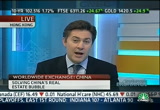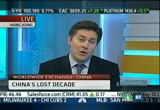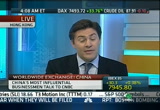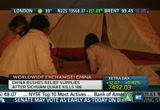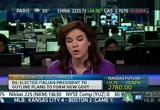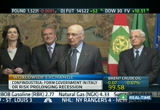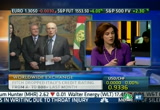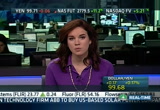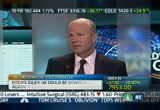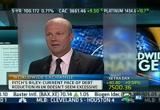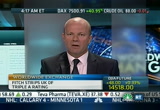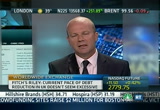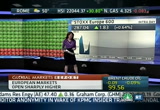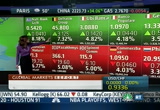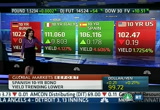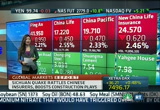tv Worldwide Exchange CNBC April 22, 2013 4:00am-6:00am EDT
4:00 am
hello and welcome to today's "worldwide exchange." i'm kelly evans examine these are your headlines from around the world. stocks in europe firmly in the green after the nikkei on surges to its highest level in five years. this after the dollar/yen nears 100 and more than 50 companies in the japanese index report earnings this week. shares in phillip falls after it warnings it expects a weak first half. but ceo tells cnbc his turn around plan is on track.
4:01 am
>> i reiterate the unlocked potential in those markets is substantial. >> and george neapolitano wins a first ever second term as an italian president. shares rallying on hopes he can end the stalemate. and charges will be filed soon in the boston bombing. investigators reportedly begin questioning the suspect about the attack. >> and i'm ross westgate. after a weekend with china's leading entrepreneurs, we'll find out why they consider the last ten years to have been something of a lost decade. >> ross westgate, not with me on set. he's out in hong kong. he's been a busy guy, as well.
4:02 am
ross, perhaps you can give viewers a sense of what they can expect from this special china edition of the show today. >> well, look, there's plenty to come, kelly. great to see you. it's been a bit of a whirlwind trip. i spent the weekend in southeastern china with the china entrepreneurs club at their annual summit of green companies. and this is basically probably the most important and biggest group of china private business leaders in the world. they include the grandfather of them is mr. tranchou who bought the ibm business collectively they have over $300 billion in rev fru back in 2011. gives you a sense of size and importance. they include china's second richest man, as well. we all hosted in this remarkable resort just outside kung ming.
4:03 am
it's a little bit like being -- in the way they build these fabulous facilities. but what was most striking to me, when i was talking to some of these guys both on the sidelines and as we'll hear in just a few moments, i was asking them what they thought about china today and the change of leadership, they told me that the surprise in business in the last ten years has been something of remarkable. i think of lost decades in terms of japan and what europe is going through at the moment. but they said, no, we've had one in china for private business and as some of them explained, this is why. >> not really lost decade. but the problem with people that are talking about this is because the state owned business is developing and they occupied lots of the resources that should be occupied by private
4:04 am
citizens. this is a turn in china. but i'm pretty sure that our new leaders understand this. so i have full confidence that for the next decade, the resources, most of the resources will come back to private businesses. and another reason is that because of the internet, mobile business, that means most of the resources can come directly, not go through the government, directly to private businesses. so i'm pretty sure that for the next ten years, chinese private business will develop even faster than in the last ten years. >> translator: now that there's a new government in place, i can finally say that the last ten years has been very bad for the economy. we've lost a lot of valuable resources and a lot of the momentum that we've had on. before, we had open markets and entrepreneurship and that's what helped china succeed. we have to go back to market
4:05 am
forces as well as fight construction. >> so juan nubol there talking about the last decade. he was the guy that tried to buy 300 kilometers of ice and is we'll talk about that a little later, as well. clear now there is a hope for reform. i'm pleased to say kung mingh, the founder of lenovo who bought the business from ibm, he explained to eunice what he wanted from private reform to help private business in the country. >> translator: my view is that the chinese government should adopt a more systemic and comprehensive approach, for example, how to escape a better sense of reform in this country so that the public will have more confidence in ensuring the culture of mutual trust can be
4:06 am
established. >> what's interesting is that this group, also becoming more influential in political circles. we'll hear a little later from the group. he's been putting proposals together for the government on what they need to do. they are getting a much more influential group, as well, and political circles. >> i want to go back, ross, to the comments we heard, as well. i'm looking at just the -- who you spoke with who was saying that, look, now that the private government is gone, i can basically talk about how bad the last two decades has been for china. that's a pretty extraordinary viewpoint from private sector. it was extraordinary. i heard it at dinner the night before, but then to actually get it on tape was rather
4:07 am
surprising. and it's this idea that they were crowded out in this previous decade. and if you said before i came on this trip, kelly, china has had a lost decade, i would look at you like what on earth are you talking about? but for them, they really do believe that. they now obviously are saying things now are going to be much better. we think what the new government is saying is fantastic. but they might have said that ten years ago, as well. >> this is what's so interesting, it's not necessarily a lost decade if you look at the top level performance as we were just talking about. how does it manifest going forward? instead of developing this needed infrastructure, is that it doesn't necessarily have that to fall back on. even now as companies feel like they have more of an opportunity, it has the moment for that opportunity already passed. >> this is an interesting point because what these guys are also facing is these guys have to
4:08 am
squeeze margins. and at the same time, the chinese government is facing the same task that we're facing in europe and in the united states. the private sector has increasingly got to generate in that sector. now that's where they see the opportunity. what's interesting, as well, is how these companies are changing their focus. we'll hear tr wonder group a little later. what's interesting about these companies, one was a property company. the other one started off as a ge and it was in steel and basic minerals. they're both reshaping themselves. wonder, they want to be a top ten global media company by 2020. they're building out health care and he also wants to develop the insurance business ala warren buffett, as well. they are thinking about how they
4:09 am
need to change and the world around them, as well. >> ross, thanks very much. we'll see you in just a couple minutes. this takes h7n9 death toll there to 20. chinese authorities say they've identified about six new cases for the world health organization. in about half of the cases, there was no direct contact with poultry. that, of course, is raising some concern. rescue workers and relief teams are also rushing supplies in china's sichuan proadvice after friday's earthquake. tens of thousands have moved into tents and cars as aftershocks continue to rock the region. the chinese visited the area over the weekend. still, the shares there across china underperforming this morning.
4:10 am
now, i also want to bring your attention to the news in greece. i think it's the second largest lender there. in any case, shares are jumping and i believe in the range of 13%, as you can see. this after saying they have sealed the deal to buy millennium pc's shares unit. shares have been savvy trying to make a series of deals and sometimes effect hely paying piraeus to take them over. read into that what you will, but it does look as though the portuguese bank has disposed of those assets. still to come on today's program, top security analysts will join us throughout the show and we'll be leave in boston at 11:00 cet. with japan's nikkei soaring to a new five-year high, we'll speak to one of the top investors who says we're generally living in asia.the the ceo will join us in just about
4:11 am
an hour's time. as eurozone countries continue to walk the tight rope between austerity and growth, we'll get the figures on debt and deficit across the region. those will be out at the top of the hour. we'll head out to shanghai. find out how the sector's key players are pricing for a chinese slowdown. and apple stocks continue to tumble ahead of the earnings report tomorrow. we'll get you the latest action from new york as investors brace for more volatility. >> george napolitano is expected to tell lawmakers today how he intends to end the political stalemate and form a new government. this after the 87-year-old was re-elected for an unprecedented second term on saturday after politicians failed to agree on another candidate. he is expected to form a bipartisan cabinet.
4:12 am
he's thought not to favor or relish the idea of fresh elections. still, his re-election has been met with anger by some including beppe grillo blasting it as a traditional party trying to hang on to power. >> they have chosen, again, a president instead who is able to guarantee the judicial power of this country in order to save berlusconi's [ bleep ] and save the left [ bleep ] with regard to the monte depasco scandal. >> politicians have been urged to finally form a government or risk a long recession in the country. georgeo said italy is not belgium and needs a government. governing in italy, quote, is not easy and almost impossible. on that note, let's introduce david riley.
4:13 am
>> morning, kelly. >> we want to talk to you about the uk just being down. we've got all this news out of italy over the weekend. >> clearly, they need to address this impasse. i think the best possible outcome, i guess, is that you get a new government that's actually formed, that can reform the electoral system so that italy can go back to the public and have a conclusive election outcome while having a weak or unfavorable government or effectively a caretaker government at the moment. >> it seems to be the best outcome for markets, in a sense. you could argue the fact that monte is pushing forward with reforms and it's not going to be a grilliot effect to risk damming the relationship with
4:14 am
through, the italian market today is up is 1.5%. >> investors have taken a view that a caretaker government that doesn't do anything, especially the one that might actually do things which they're not very happy about. also some of the economic reforms. but i think realistically, that's not a stable, tenable situation. they need to move forward with put ago form of government in place which can hopefully lead italy out of the recession. >> and improve the democratic process, as well. david, stay right there. despite napolitano being elected in italy, a snap ruling can't be ruled out. head over to cnbc.com to read more about that. now, i mentioned britain and pressure, of course, is mounting on britain's chancellor george osborne to rethink his party's economic policy on friday after
4:15 am
fitch became the second firm to strip its coveted aaa rating. the chancellor's policies do face a key tuesday this thursday with the release of fist quarter gdp. >> we decided to wait until the budget and the updated budget. with we incorporated those numbers into our own medium term projections, uk debt is going to peak at a higher level, 100% of national income and stay higher for longer than we previously anticipated. that's largely because of the weakness of the economic recovery. when you put numbers together, the uk no longer adds up to a aaa rating. >> can i argue this is fitch's fault because they focus so much on debt levels and deficit
4:16 am
levels and push country toes adopt austerity policies that undermine their long-term growth, then they turn around and get downgraded for it. do you have to not acknowledge your role in this whole process? >> i think there's a general point which is a schizophrenia among bull markets which is this is very large deficit and rising dead saying, you have to do something about that. as governments trying and do something about that, there is negative impact on short-term growth. i think it's a bit like your earlier discussion. we are providing advice. one could argue that the pace of austerity could be too harsh in the first years of this parliament. but the reality is the government has slowed down. in fact, the deficit on a headline basis isn't really changing. >> sure. >> at the moment. and the bottom line is the uk level of national debt has more than doubled and that's not
4:17 am
consistent with it retaining its aaa rating. >> we want to bring ross into this convo. ross. >> hi, david. if the government use tim ewe husband to generate better growth, whether it was through tax cuts and other inners and supply side reforms, would you cut them some slack on that or not? >> we would -- we think there's fairly limited room for significant fiscal stimulus that would place public debt on, you know, steeper gradient in terms of its rise. right from the beginning of the process, we recognized the government can use their balance sheet and fiscal measures to offset the decline in private sector demand. so some measures which allow for an easing of the levels of deficit reduction and the pace of that is perfectly consistent with the current rating that we now have on the uk.
4:18 am
but can the uk go on a major fiscal stimulus exercise? we don't really think there's much room for maneuver in terms of them to do that in terms of a ratings perspective. >> what happens if they -- they could go on a big tax cutting program and that got rates going. this is more about growth, isn't it, right now, because growth is a way to generate the revenue to bring down the deficit. >> yeah. but that's evident that if you do tax cuts, that you'll get more revenue isn't very strong, to be frank. otherwise, lots of governments would be doing that because it's a win-win situation. you're cutting tax rates and voters like that and you're getting more money through the door. i think the other aspect to bear in mind is that they have taken a decision between the balance in spending cuts and tax. and, actually, the government has been effectively reducing some tax rates, both at the higher end and in terms of
4:19 am
raising taxable allowances. spending, like national health spend, you have some stringent cuts elsewhere. that's the choice for the government of the day to make. that's a more friendly approach than one which relies more on increases in tax. >> yeah. thanks indeed for speaking with us. let's fine out and bring you up to speed with what's happening on global asset prices. >> we are seeing pretty much green across the european region with advancers outpacing decliners. the stoxx europe 600 is up about 0.6%. driven earlier by italy.
4:20 am
he stilt needs to form a government, but there's a sense that there's some stability flowing through for this region. the xetra dax down well this morning, back above 27,500 level having broken through its trend line as some of the market were talking about in the last couple of months, it has been holding since february. there will be a lot of attention now to see whether it can keep a floor. the ftse 100 up about the same amount today. here is a look at the top losers and can gainers across europe. the italian financials in particular are driving the rally, but also over here the national bank of greece. we just learned perus put in a double digit gain this morning. i love this story, do you want to know why? delhaize group, they own food lion, the food chain in the u.s.
4:21 am
if you've ever traveled in america in the southeast you now know who its parent is. it is the performance of food lion which is driving the stronger results at delhaize group this morning. over here, i want to draw your attention to phillip, often seen here as the european bellwether, it's down better than 4% after posting results that beat earnings, missed on revenue. i think if i've got that right, it's the same theme we're seeing across the u.s. and potentially could see the same theme that starts to come out of earnings season. here is a look at what's happening in bond rates now. the ten-year spanish and italian debt is falling. italy is nosing towards level that could be sub-4%. this is an extraordinary statement for a country struggling with politics as it is. 4.1%, 4.6% for spain. a bit of a rotation out of spain this morning.
4:22 am
we're seeing it fall 0.3% even if european stocks are rallying, suggesting this is driven by talk about the european central bank potentially cutting rates. they're continuing to walk back that talk, but nevertheless you see the reaction. and the dollar/yen is falling just a bit, but we're watching to see if it breaches that 100 level this week. let's check on how that's affecting trade in the nikkei and across the region with li sixuan. hi, sixuan. >> thank you, kelly. a largely positive day in asia thanks to abe-economics in japan. the nikkei close to a five-year high as the dollar/yen hovers just shy of the 100 level boosting exporter stocks. this asset g-20 member stopped just short of radicalizing the
4:23 am
group. kospi gained 1% today. australia's asx 200 closed higher by 0.7.%. a rebound in oil and gold prices helped miners claw back some lost ground. banks were higher after recent cuts in the resources sectors. india's sensex trading higher by 0.5% at the moment, but the country's i.t. giant wipro tanking almost 9% at the moment after posting a weak q1 guidance last friday when markets were closed. and as for the market laggers today, china markets underperformed the rest of asia with the shanghai composite ending lower by a modest 0.1%. stocks in china reacted to the 7.0 earthquake over the weekend. insurers came under pressure on worries that payouts after the natural disaster could hurt margins. china pacific, ping an, china
4:24 am
pacific and new china life insurance all lost over 2%. cement and steelmakers, heavy machinery and some of the expressway stocks in the region soared limit up by 10%. back to you. >> thanks very much for that, sixu sixuan. appreciate it. still to come on the program, as investigators try to piece together the missing pieces of the boston security plot, it's said this might improve ties between russia and the united states. find out why when we come back. welcnew york state, where cutting taxes for families and businesses is our business. we've reduced taxes and lowered costs to save businesses more than two billion dollars to grow jobs, cut middle class income taxes to the lowest rate in sixty years, and we're creating tax free zones for business startups.
4:25 am
4:27 am
u.s. prosecutors are prepping charges against dzhokar tsarnaev. investigators won't say whether they've been begun questioning him in the hospital. he's unable to speak after being shot in the throat. fbi wants to speak with his wife's older brother -- i'm sorry, with his older brother who was killed in the shoot-out thursday night. dr. collins is here, head of north american maple croft. welcome. so, look, first of all, how complicating will this be for the investigation if they're unable to get him to speak?
4:28 am
it sounds as though he's beginning to write. >> yes. thanks for having me on this morning. it's important in the beginning context and for this instance. so this is the first islamist attack on the united states since 9/11. in 2006, we had the liquid bomb plot that was foiled. and there's the underwear bomb plot in 2009. the times square plot in 2010. this is the first real attack since 2001. >> first successful attack is what you're saying. >> exactly. so it's quite a shock for the united states. in some ways, it's -- obviously, there's the two brothers involved in this incident. the older brother would have been a more significant person of interest in terms of the intelligence because he was the person that traveled to russia and there's the possible links with chechan terrorists in russia. >> and this is an interesting angle of this, as well. the first successful islamist
4:29 am
attack in the united states, i think americans were expecting to here a more familiar name than chechnya. what does that imply to you? chechen terrorists previously attacked soft attacks in russia. 2004, the scene at the school where almost 400 people died. 2010, the attack on the metro in moscow. so this is the first time we've seen chechen link in the united states. this will be interesting to see how this develops. >> exactly. the real question seems to be, regardless of their influence or their inoperation, did these guys act alone or were they part of a broader network where this is part of a bigger plan? >> this is where tensions are going to focus on the fbi. in 2011, the russian government supposedly contacted the fbi and informed them that this was a person of interest.
4:30 am
2012, he traveled to pakistan for six months. so the tension is going to focus on the obama administration and following this. we saw during the presidential election campaign mitt romney continually criticized the president being soft on terrorism inspect.. >> and the benghazi incident where it seemed they -- responding to the threat sfp. >> the obama administration was reluctant to use the word terrorism and link it with al qaeda. we saw that a little bit last week, a day before the word "terrorist" was used. this is the line the republicans will use against the president, that he's soft on terror. we're already seeing senior republicans accusing the fbi of dropping the ball on this one, senator lindsay graham and senior members of the house. >> are they justified? is there any way of knowing how many threats like this come into the u.s. on a daily, even hourly basis, and whether in the grand scheme of thing this one ought to have raised the flags?
4:31 am
>> i'm not privy to the particular piece of intelligence on this. i imagine obviously they would have thousands of these and things on an annual basis. lindsey graham has said there are two possible ways that the fbi dropped the ball on this. first, it could have been a systemic failure in the sense that the procedures were following up on these warnings were floored or secondly there was some individual floor related to this. >> briefly, because you have said that, look, despite the fact that this may now have russia sort of saying, look, we tried to warn the u.s., look at that relationship between russia and chechnya, just because the u.s. and russia have to communicate about this issue, that it could help relations between these two countries. >> that's something we can see going forward. u.s.-russian relations have been terrible the last few years. a travel ban and asset freeze on senior russian officials and the russians retaliated with a sisir ban on u.s. officials
4:32 am
linked with guantanamo bay. >> and he's u.s. adoptions. >> u.s. adoptions, exactly. there's indications that relations could be warming and is we have the winter olympics next year in sochi. >> we'll need a lot of international cooperation on security, as well. >> exactly. and vladimir putin doesn't want any terrorism to marr that event. >> thank you so much. >> runners from the london marathon yesterday did pay respect to the victims in boston. many entrants wore black ribbons in their honor and a 30 second moment of peace occurred before the race. some racers there wore t-shirt toes remember the victims of the boston bombing. still to come on the show, it's on. the european werings season kicking off today with philips reporting first quarter results.
4:33 am
we'll preview the quarter's earnings with citigroup's johnson stubbs when we come back. and on "worldwide exchange" in china, for from my weekend with the china entrepreneur's club. we'll hear from the chairman of vanke, china's biggest property group on what do you do with the real estate bubble? "worldwide exchange" continues in just a few moments. the new blackberry z10 lets you jump backwards and forwards in time to capture the perfect shot. blackberry z10 with time shift. built to keep you moving. see it in action at blackberry.com/z10
4:36 am
welcome back to the program. these are your headlines. stocks in europe firmly in the green after the nikkei surges to its highest level in five years. this is the dollar/yen eyes a hundred and is more than 50 companies in the nikkei report earnings this week. shares in philips are down as the european earnings bellwether reports it expects a weak first half. the ceo tells cnbc he remains bullish on china. >> you see in china still double digit growth for philips. and that's basically across the board of health care, lifestyle and lighting. and talking about china in this half hour of "worldwide exchange," how do you let down the chinese real estate bubble slowly? we'll talk to one of the condition's leading real estate developers.
4:37 am
>> yes. more to come on china in just a couple of minutes. we continue our coverage from there this week. here is a look at what's happening in europe. the ftse mib, the italian index now better than 2%. this follows and adds some pretty big moves to the upside this week. italy responding well to news of george napolitano. the 87-year-old's president relekdz to an unprecedented second term. let's look at the bond space where we're seeing italian debt rally. following percent to 4.13%. just extraordinary. meanwhile, safe haven flows, i should say the safe havens typically of the u.s. and germ xwran bund are seeing outflows this morning with yields moving ever so slightly up, as well. forex rates show the euro/dollar weakening perhaps linked to the stock rally after there continues to be speculation about whether the central bank can cut rates. perhaps more significant, they're watching the dollar/yen
4:38 am
level. we are ever closer to the 100 mark at 99.73. perhaps this will be the week in which we breach it once again. philips shares are lower again after the company posted weaker than expected sales. we spoke with philips ceo in the first on cnbc interview and he reiterated the company's turn around plan is on track. he did, though, signal trouble is ahead in the u.s. as the health care reform continues to hurt sales. >> we said we would see a slow start of the year. but there are certainly highlights to talk about. i mean, i am proud that our consumer lifestyle division grew almost 10% on the back of very strong innovations and basically across the globe in europe, in the far east. we also saw, you know, strong growth in growth markets, 4%. what was disappointing were the markets of the united states and europe. i think we talked in jrn about
4:39 am
the united states where health care reform is going on and that is making hospital ceos very careful about their capital investments. and i think that is what is slowing down debt marketplace. we reiterate that we are committed to reach the three targets of the 4% to 6% compound after growth rate, the 10% to 12% reported ibita and the 12% return on investment capital. >> interesting. let's get more from john from citigroup. how much of a bellwether is philips? >> good morning. slightly disappointing earnings on one side spp that's been the norm in europe and globally. we measure this on an earnings revision index and we've seen 50
4:40 am
consecutive net downgrade weeks in a row after the last year or so. however, policy news flow is driving markets the other way. you mentioned the performance of italian equities just now. also if you look at japan overnight. so disappointing earnings on itself is not enough to take these markets down. i think as we go through the next couple of months in europe, that the earnings season will deliver mixed news flow. but ultimately, where share prices goes will be determined by what happens away from earnings and in the political and top policy arenas. >> and it's interesting because there's no way european earnings are going to surprise to the upside. at the same time, everyone is expecting this to be a weak period. its equities are cheap level to credit here and it's going to take sharply higher interest rates to knock this rally down. you don't expect either at this point. >> we described the underlying macro back drop as goldilocks in
4:41 am
a straight jacket. what we mean by that is the policy globally for the global economy is very strong. policymakers doing all they can to prevent systemic risk which obviously carries a very dangerous sort of implications for economies and societies. on the other side, you know, there's still too much debt in the world, especially in the developed world. so deleveraging is a fundamental feeling on growth. so it's hard to see the global economy breaking out of the slow to modest growth environment. interest rates we think will stay pretty low. that overall is a reasonably attractive back drop for companies to deliver okay earnings growth. and so we can take earnings disappointments as long as it's minor. but as you say, it is a gdp and an earnings cliff, then we return to late '07/'08 type markets. we don't think it's going to happen, though. >> jonathan, it's ross here. what would you describe as okay earnings growth? >> well, i mean, okay in the context of the last six to nine months has been earnings estimates coming down week after
4:42 am
week after week after week. the aggregate impact of that, though, is that european earnings growth expectations for 2012, remember those numbers are not finalized until we see the full years coming in the first part of this year. analyst expectations started last year around plus 10% and then our minus 3%. that's quite a big shift down when you put that into context of what we saw in 2008 where the earnings estimates went from plus 20 to minus 50%. so we've really seen in the context of previously earnings recessions and earnings swings, modest earnings downgrade. at the same time, you know, the market is starting to look ahead to the second half of this your, stronger u.s. data coming through on the economic side. into 2014, as well, where our economists expect to see the global economy to modestly peck up and the outlook looks more supportive as you get ahead to the corporate sector. where terms are modest and
4:43 am
equities are an issue, you have to be a big earnings bear and that's not our case. >> your long of some insurers, you're long of the health care sector as i understand it and food and is beverage, as well. those -- you know, you could suggest those are fairly safe sectors, you know, cash again rafb. >> yeah. our strategy over the last couple of years has been to run what we call a bar bell strategy. we think we're sort of mid cycle. investors want to earn leadership strategies. you want to own companies which have exposure. the good part of the on global economy and less of the bad parts of it, i.e. europe, and that takes you to what we call defensive growth, defensive growth, as you say, is health care, is tapels, parts of the media, parts of the technology space, as well, clearly
4:44 am
defensive growth. and then the other part of the bar bell, we want to take advantage of some of those attractive valuations in equities and in europe. we would rather go into financials selectively and look at those insurance companies, those banks, as well, which is perhaps have sold off more in the market than the recent pullback and look at all of those companies which have improving or strong capital positions. and you end up looking at some of the german insurers and the swiss bank. they look pretty strong for us. >> jonathan, thanks very much for that. . today is also worldwide -- in china, "worldwide exchange" in china day. i'm in hong kong because i've just spent the weekend at the china entrepreneur's club annual meeting of green companies in china. i've just come back from there and the china entrepreneur's club is a group 50, 51 of the leading ceos of the private companies. around $300 billion in revenue
4:45 am
is what those combined companies have. one of the sectors we've been focusing on, of course, is real estate and this real estate bubble. real estate and associated companies account for around 20% of gdp in the country. and i sat down for an exclusive interview with wang xi with the biggest property developer in china. i started off by asking him how do you let out this bubble without damaging the rest of the economy? >> translator: there's always been a bubble in the chinese real estate market. from a macro level, we can see that in the last few years there have been efforts to control property prices. that seems to be effective. and from that per speblgive, i do think there will be more of a soft landing. however, it's all about containing the bubble. the next step is how we control the surprise increases and this seems to be a bit uncertain.but with effective policy, we will
4:46 am
see there is much more change and we'll be able to deal with it. we can hardly deal with this effectively such that it doesn't become a big problem. >> and is if you look at places like shanghai, prices there are around 45 times average salary, which shows you the scale of the bubble. can you do anything with temporary price controls? what can you do to sort of control this through the market? >> it's not just a market issue, but about education, health care and resources found within those cities. that's why there's a lot of traction to cities like shanghai and beijing, even though the prices are higher. if you look close to these areas, it has good economy. however, many middle income citizens will not want to live there because it doesn't have the schools and the health care system to support it compared to shanghai. but after these temporary controls, i don't think the
4:47 am
prices will continue to rise that fast. while the economy is growing about 7%, income rates are only at double digits. the problem is that china is very big and there are many second and third-tier cities where prices aren't rising as fast as shanghai and beijing. my concern is that price increaseses in those two cities can't be control, it will result in other price increases, as well, and that won't be a good thing. >> because of the increase in prices in china, we start to see a lot of developers move over to the united states. do you see that increasing in response? what are the opportunities right now? what's your view of that market? >> there are several reasons behind vanke's decision to invest in the u.s. firstly, globalization. while china is growing fast, the development cannot always be within china, even though there's strong financial markets in hong kong. therefore, it is still a leveraged way to go out into the
4:48 am
global markets. secondly, why the u.s. and not europe where there's also developed markets? the u.s. has a lot of land similar to china, but the u.s. is a more developed market. we think the u.s. has a lot to offer in our learning path in the real estate industry. thirdly, we're looking to developing countries in southeast asia, south africa, brazil and russia and we hope this will help the country's developments and to look out for local partners to codevelop and invest with them. finally, we want to follow where our customers are going. and almost all new immigrantes from china are headed to the u.s. so we see this as a great way to have an already established brand that chinese customers will recognize. >> we've lost the sound for ross. hang on, ross, we'll get you back in just a second. some fascinating stuff in his interviews.
4:49 am
as we turn our attention to the u.s. housing market today, china is an interesting case where you've had a period of real estate property prices booming. yet the stock market continues to underperform. and people would like to encourage some place to go in the market besides real estate and can't quite seem to do so. the more those markets persist, the likely they are to continue to follow them instead of fighting them. stick around. ahead on the show, we will get a fresh check on spain's fiscal picture. eurozone countries report their full year deficit and debt figures at the top of the next hour. stephane will join us live from madrid with a preview when we come back. welcnew york state, where cutting taxes for families and businesses is our business. we've reduced taxes and lowered costs to save businesses more than two billion dollars to grow jobs, cut middle class income taxes to the lowest rate in sixty years,
4:50 am
4:52 am
we've just been talking about the real estate sector in china. we had that interview from vanke group. i also sat down with the chairman of the jong kung investment group, another big developer. this is his view of what's going on with real estate in china at the moment. >> translator: the real estate market has been hit very hard, has been a pillar for a lot of the local provincial government.
4:53 am
without this sector going fast, it's hard for the local government's debt, employment and market to grow. so in the next two to three years, the new government must focus on getting the property sector back to normal. >> what's interesting, kelly, is that both gentlemen are very good mates. they both climbed everest twice together, which is a fascinating story. but mr. huang had the same view that the u.s. is now the place to invest in real estate. the fascinating thing about the interview was that as the chinese im grates to the united states, the chinese properties are following. vanke is doing more investment property because they know that's where their chinese customer is going. >> which is an interesting point because immigration can be such a provocative issue in the u.s., even when it comes to attracting the best and brightest, there's
4:54 am
still a sense that policy isn't loose enough. >> exactly. and we have this immigration question everywhere. i think it's fascinating that huang xi has spent the last better part of two years studying at harvard and cambridge, as well. he's now sort of the official chairman. but with the basic promise that he wants to better understand the culture of the west and how chinese companies should do, as well. it's a subject we'll look back when we come back in the next part of the series. this is a lot of what the weekend has been about is, really, bridging this understanding between chinese business kul the temperature and western culture. there are some things that are similar and some things quite different. >> and plenty of met fors for them. ross, thanks very much. we're going to talk about japan
4:55 am
briefly where work to fix boeing's 787 dreamliners has begun. makiko joins us live now with the story from tokyo. hi, makiko. >> hello, kelly. with help from boeing engineers, the two carriers are now replacing battery wes modified ones. they include more protection around the cells to kab overheating, a case to prevent a fire from spreading. the replacement work is estimated to take about five days per aircraft followed by several weeks of test flights. the carriers are hoping to resume operations and start flying passengers in june. japan's all nippon airways own 17 dream liners. all jets worldwide have been grounded since mid january when a battery overheating caused smoke in two of them. about third of the jets' components are supplied by japanese companies. and battery supplies gs yuasa
4:56 am
has conducted a joint investigation with boeing. so far, no problems have been found in their test process. this incident seems to have limited impact on production. back to you, kelly. >> thank you, makiko. let's get straight out to stephane now because we're about to find out just how big spain's deficit and debt numbers were last year. what number should we watch? >> 6.9% for the deficit last year, which would be higher than the 6.3% target set by the government. and that's cost the cost of bailing out the spanish sector including the rescue package from the bank. as a result, spain should be given more time to lower its public deficit below 3% of gdp. since 2016 would be the new targets two years later than expected. this is what we are expecting in the next couple of days. this confirmation and that would be -- that would give the
4:57 am
spanish government a bit more flebsbility, a bit more margin to implement some stimulus measure toes hopefully drive the country out of recession. we are expecting the spanish economy to shrink again this year between 1% .1.5% gdp and that's the forecast. and we also are expected the government to announce by the end of the week some new measures, a new budget plan or the next couple of years. watch this basic less than three minutes we'll have the deficit for spain and the rest of europe. >> stephane, i love 6.89%. you can tell they're trying too void that 7% mark. let's see if they succeed. those figures out right when we come back. don't go thir. more "worldwide exchange" when we come back.
5:00 am
welcome back to "worldwide exchange." these are your headlines. stocks in europe firmly in the green after the nikkei surges to its highest levels in five years. this as the dollar/yen nears the 100 mark and more than 50 companies in the japanese index report earnings this week. shares in europe are down after bellwether philips says it expects lower sales in the first quarter. the turn around plan is on track. >> we have successfully repositioned the philips group in profitable growth areas.
5:01 am
i reiterate that the unlocked potential of the philips group in those markets is substantial. >> and george napolitano wins a first ever second term as an italian president. shares rallying on hopes he can form a government and end two months of political stalemate. and charges could be filed soon against the suspect in the boston bombing as investigators reportedly begin questioning him about the attack. and as chinese firms increasingly invest and buy properties overseas, we'll look at the challenges faced by chinese companies in going global. >> announcer: you're watching "worldwide exchange," bringing you business news from around the globe. >> u.s. prosecutors are prepping charges against boston bombing suspect dzhokar tsarnaev.
5:02 am
authorities are beginning to question him in the hospital. he's unable to speak after being shot in the throat. scott cohen joins us now with the latest from boston. scott, good to see you this morning. look, it's been a long weekend and we've been learning quite a bit. by the way, is there a sense that this wound to the throat was intentional so the suspect wouldn't talk? >> that seems to be the case, kelly, based on the trajectory of the bullet wound and the like. and may have been a last desperation attempt to end it all on friday night as the authorities were closing in on dzhokar tsarnaev. we do expect that criminal charges could come as soon as today. he is starting to respond to the authorities in the hospital. listed in serious but stable condition according to authorities here. we do know before the police chase erupted, that tsarnaev was
5:03 am
essentially hiding in plain sight. he was a student at the university and students say he was there, working out and talking about the bombings. >> he just said, yeah, tragedies happen, man. these things happen around the world. it's crazy. he seemed nonchalant. he didn't seem nervous or anything. >> meantime, here in boston, there is an attempt to get this city back to normal to some degree. investigators are continuing to investigate the crime scenes. it has been one week since the bombings and at 2:50 eastern time this afternoon, one week exactly since the bombings, they will toll church bells throughout boston. kelly, back to you. >> scott, thanks very much.
5:04 am
we'll leave it there for the time being. let's bring you a little bit of breaking news out of the e o eurozo eurozone. eurostadt just released its 2012 deficit figures for the eurozone. there are some pretty ugly numbers in here, tigly for spain, running a 10.6% budget deficit in 2012 managing it the largest of any eurozone member, larger than greece's which was at 10%. pretty ugly numbers. cyprus, 6.3%. slovenia which, of course, has been a market focus lately, 4% of gdp. ireland, about 7.5%. and the british government deficit was 6.3%. some of these figures pretty much in line with what we've already known. others, particularly the spanish ones in particular, can we show the reaction? down about 0.3%. revly where we were before the release of these figures which suggest either it was priced in already and others have more to be concerned about.
5:05 am
we'll have more from stephane pedrazzi in just a second. we would like to speak with james forest. james, it's great to see you again. look, i just wonder if you can clarify for us your own impression at this point as to whether these two individuals acted alone for whatever motivation or whether they were part of a larger plot. >> well, that's, of course, the big question that everybody wants to know. did they receive any kind of strategic guidance or tactical training from any terrorist network overseas or even here in the boston area? investigators are definitely exploring that particular avenue. >> what to you are the key could says of information here as we put it together? >> well, as far as we know right now, it does not appear that they received any sort of operational training. there is some question about the individuals that tamerlan, the older brother, may have met up
5:06 am
with there in russia when he went there tore about six months. right now, investigators aren't finding any leads locally of an additional cell member or that sort of thing. >> and you've said one of the yoens why there was involvement beyond these two individuals is because they knew in advance which way cameras would be pointing at the boston marathon, something a more sophisticated group would look for as opposed to right wing domestic terrorists. >> absolutely. actually, all the discussion about the lone wolf terrorism aspect of this, we haven't seen that kind of media amplification in the past rau regarding lone wolf terrorist attacks. that is what leads authorities to believe there may be some additional strategic or operational guidance provided from the outside. if they did all this on their own, entirely on their own, it certainly indicates they did a lot of homework and a lot of pla
5:07 am
planning before they made this attack. >> the extent to which there is any al qaeda presence here is going to be one of the main questions for authorities to wade through. and where does your own interpretation of these events currently stand? >> well, the al qaeda global ideology, if you will, is very simple. it's think globally but act locally. so in that regard, you see a small one or two individuals cell kind of a thing here. motivated and mobilized to conduct their own attacks without really any supervision or support, financial support or whatnot from outside of the local city. we've seen that kind of attack, especially over the last, say, 10 to 12 years we've seen plenty of plots and attempted attacks of that kind where there's no direct operational linkages to al qaeda cells. in this case, you know, the linkage to the caucuses, chechnya and their struggle is
5:08 am
against the russian government, the russian federation. so it remains to be seen what they could have possibly thought they would achieve by attacking the boston marathon in regards to that kind of struggle. >> exactly. that main question remains unanswered. we'll leave tlit for now. james forest, thank you, sir, for your time. we'll pick up with this story in just about half an hour's time. let's check in on markets. u.s. futures are pointing higher, still having one of their worst weeks of the year. we saw the vix jump, too. people questioning whether it's the beginning of a more significant rallying. nevertheless, we're still looking for a bit of a rebound extending here. the dow looking to add about 50 points at the open. this is up better than 2% after george napolitano was re-elected president there. he is 87 years old, did not want the election. but is basically taking it on to help promote stability and try
5:09 am
to find a better way for a government to form in order to reassure markets. lots of reassuring coming from that news, though. italian debt, if we can flip over and show that, as well, what's happening across is space is also rallying. we're seeing it fall down 04.11 is%. spain, just releasing figures from eurostat showing it has a 10% deficit last year. what's happening? rallying spanish debt to almost 4.5%. some flows out of the u.s. and out of gild, as well. we know the u.s./dollar has been a little weaker throughout the session this morning. there's been chatter about ecb rate cuts which may help why we're seeing the euro underperform and european stocks doing better. i mentioned philips out. the european barometer echoing basically what we've heard out of the u.s. the dollar/yen has now flipped up to the up side, 99.8.
5:10 am
we are within 20 basis point of that psychological level. it has given a major boost to the nikkei. out to li sixuan from singapore with more. >> thank you, kelly. a decent start for asian markets this week following the positive close on wall street on friday. the nikkei 225 was a stand out winner, up nearly 2% thanks to abe-nomices figures. this is near the hundred level versus the u.s. dollar after the g-20 avoided criticizing japan for its radical easing moves. meanwhile, south korea's kospi gained 1% as tech shares in banking stocks gained support. a rebound in global oil and gold prices helped miners claw back some lost ground. bank were broadly higher on hopes of a rate cut due to the recent plunge in resources
5:11 am
sectors. india's sensex on the move trading higher by about 0.7%. but the country's i.t. giant, wipro, tanking over 8% at the moment after posting weak q1 guidance on friday. and as for the market laggers today, china markets underperformed the rest of asia with the shanghai deposit ending lower by 0.1%. stocks reacted to the 00.7 magnitude earthquake over the weekend. ping an, china life, china pacific, new china life insurance all lost over 2%. but reconstruction related stocks capped losses on that market, including cement and steelmakers, heavy machinery and expressway stocks. they soared limit up by about 10% today. that's a look at the asian markets. back to you. >> thanks very much for that. now, friday marked the end of the worst week for the dow jones
5:12 am
in almost a year. the index fell 2.114% to be precise. that was the biggest weekly decline since june. meanwhile, in the nasdaq, apple shares suffer a big hit. trading down nearly 45% from september's all-time high. if you had shorted apple and went long the nikkei, hedging for the yen in the end of the last year, you would have done pretty well for yourself. apple's free fall led across the board. there were big swings on the vix. a large increase for the year. let's hear more from charles beesly. pushes a little bit of money around. charles, thanks very much for your time. first of all, just to pick up on these market levels we're starting to see here, are you changing asset allocation in the wake of the moves we've seen just in the last week or so? >> no. first of all, i don't think that japanese resell investors move that quickly. we've seen a lot of speculation in the press about this wave of
5:13 am
japanese money leaving japan, in fact even affecting european bond markets, it's just not true. the resell investors are much more sanguin. they've got about 45% of their assets in international securities and international bonds. anything we see on the margin i think is unlikely to affect the markets the same way people are speculating in europe at the moment. >> and what about u.s. markets relative to japanese ones at this point? >> i think the u.s. equity market has profound significance for japan, given the strength or the relative strength of the u.s. economy and something we talked about actively at the end of the laugh year, particularly with on shoring of manufacturing industry back to the united states. clearly, the end of the financial crisis, the liquidity crisis, the improving housing market in the u.s. and shale gas gives the possibility for the u.s. to develop current account surpluses over the next three to five years. if that happens, then this move in the yen, which we've been
5:14 am
experiencing largely for domestic reasons here becomes quite persistent. if that's the case, then the japanese investors need to have money as a hedge against importing u.s.-led price inflation in the united states. that is exactly what we saw at the end of the lar last year. there was a $3 billion equity fund that we launched in december that i think gives leg to that argument. >> as opposed to bernanke reinflating the world, now perhaps japan is accomplishing that. let's pick up, charles, on the theme of inest having in japan in just a second if you'll stay there. on the agenda in the u.s., march existing home sales are out at 10 on o'clock a.m. eastern. later in the week, we'll get reports on new home sales, durable goods and fist quarter gdp which is expected to be one of the strongest prints in the recovery. it's also the heaviest leaks for earnings. 1 members of the s&p are set to report and shortly we'll hear from caterpillar, followed by
5:15 am
halliburton, has bro, netflix and texas instruments. york stat, where cutting taxes for families and businesses is our business. we've reduced taxes and lowered costs to save businesses more than two billion dollars to grow jobs, cut middle class income taxes to the lowest rate in sixty years, and we're creating tax free zones for business startups. the new new york is working creating tens of thousands of new businesses, and we're just getting started. to grow or start your business visit thenewny.com
5:17 am
5:18 am
in the first quarter. the european earnings giant warnings its on course for a weak first half. and u.s. prosecutors are prepping charges against the boston bombing suspect, though it's still unclear when they'll be filed. so kelly is in london. i am in hong kong today because i have spent the weekend in china, the china entrepreneur's annual summit meeting. we'll have more on that still to come on the program. but still with us is charles beesly from nikko asset management. charles, you mentioned earlier that there would be a persist yebt move in the yen. pimco have come out and said the bank of japan moves means that it's a green light to short sell the japanese currency. what do you mean in value terms by persistent move in the yen? >> well, i think you have to place it in its political conte context. this is not merely an economic or monetary or fiscal moving.
5:19 am
abe has had confirmation today that his ratings are now at 76%. the ldp now has a 56% approval rating, the highest in its post war history. what abe is attempting to do is to end deflation. if he succeeds in doing that, quite clear, the fiscal policy and the monetary policy moves will result in the easing of the yen that we've seen. when i use the word persistent, my sense is that this continues. i don't know if it continues to the point at which it becomes a problem. it won't if abe delivers on the preliminary reforms. you about i would see a trading between 95 and 105 quite easily. i think possibly then in the next several months to two years, it drifts up. >> okay. but there's an "if" in there, right? you said if they beat detlagz. how big of an if is that? >> well, i think as i said on your program when we last met in
5:20 am
london, is that the size of the political deposit abe san has received from the electric is quite -- we haven't seen had since the koizumi period. you can see, by the way, he's attacking the tpp issue, which has, you know, at its heart the removal of terrorists, which may make agriculture, particularly rice farming, very, very difficult to deal with. that's a little bit like the french saying we're going to deal with the common agriculture policy. this is profoundly important. so if he deals with those issues and looks like he's dealing with them, if wages start to rise, then i think that abe-san will be seen to be successful. if he doesn't, then we have to see the confirmation of this, that's where the if comes in. >> charles, we will leave tlit and ask we will watch wages closely. thanks very much. we'll hear from ross again in just a second.
5:21 am
spanish deficit was up to 10.6% of gdp. stephane joins us now live from madrid. >> there is no surprise. 10.6% of gdp. there's a reason behind it. it's the cost of bailing out the spanish banking sector. eurostadt did not give the details about the calculation, but without the cost of bailing out the banking sector, the deficit was 6.9% of gdp, which is higher than the 3% target set by the government, but of course that would be much lower than the 10%, for instance, deficit that we've seen in greece last year as a result, of course, the spanish debt is rising. it's now 84.2% of the spanish gdp. that's a sharp increase if you compare to the level before the
5:22 am
prices in spain. and there's a paradox in that announcement. yes, we've seen some positive reaction on the bond market. the other part is that it will actually help the government to ask for more time to reduce its public deficit below 3% of ggdp. the new target will be 2016, two years later than expected, and that will give the government a bit of precome, a bit of margin to implement from the measures to boost the spanish economy and hopefully to drive the country out of recession. the finance minister this morning said that the government will present by the end of the week a new budget plan that will not focus only on deficit reduction, but also will have some stimulus measure toes boost the spanish economy. kelly, over to you. >> stephane, thanks very much for that. >> right. it started with lenovo buying ibm's pc business. we've heard today how property developers are moving into the united states. still to come on "worldwide exchange," what's next for
5:23 am
5:26 am
entrepreneur's club meeting of companies hosted over the weekend. plenty of subjects under discussion. one of those with this leading group of china entrepreneurs and is private businessmen is what they do about going global. it started, of course, with lep novo buying the pc business of ibm. but now china companies are investing all over on the world. it's a subject i picked up with the chairman of wando group who bought the amc business for 3.6 billion back in september. i kicked off first of all with the man that's being described as the warren buffett of china, the chairman of the foson group. he's made investments in club med. and i asked him what is the driving factor wind his investments overseas? >> translator: from our side, it is very clear that when it comes to our investments, we want to be a global but yet chinese investment firm. together, we want to use our
5:27 am
resources and our people and put all of them so we can help china and global companies develop. >> translator: my belief is that i don't require the company culture to be like one amc. they can keep it to what it was before we purchased it. for example, after the amc deal, we only sent one person and that one person was the key communicator from wanda to amc and kept all the culture and leaders the same. >> the first count, the people who see they're going to dominate china. they want to focus on that market as a massive market and they're going to make that a success. i think the other camp have a real passion to go global. they want to be successful, thoept be the best in the world. and, clearly, they've got different challenges. the global one is much, much harder. and i think that the first wave of chinese companies having some successes, two steps forward, one step back, but i think a lot of the rest of them have to learn how to go global. >> that's the challenge facing
5:28 am
chinese companies. i thought it was fascinating. we're going to have longer interviews this week with these guys. i think it's fascinating, he's the second richest man in china. when he bought amc 245e9ers, he just put one man from his business into it and they kept everything the same. >> at least for now. we'll watch and see if it stays that way. ross, great stuff. thanks very much. still to come on the program, we'll follow the latest developments out in boston. we will speak to a top security analyst on the origins of the attacks and what it means for future counter terrorism efforts in the u.s. here is a look at how futures are trading. green arrows. dow down about 60 points at the open. we'll be right back.
5:31 am
welcome back to "worldwide exchange." i'm kelly evans and these are your headlines from around the world. charges could be filed soon against a suspect in the boston bombings as investigators reportedly begin questioning him about the attack. stocks in europe firmly in the green after the nikkei surges to its highest level in five years as the dollar/yen is about to breach that 100 level in more than 50 companies in the japanese report earnings this can week. shares in philips falling as the european bellwether posts lower than expected sales in q11 is. still, the ceo says his turn around plan is on track. >> we have successfully
5:32 am
repositioned the philips group in profitable growth area. i reiterate that the unlocked potential of the philips group in those markets is substantial. and spain's budget deficit widens more than expected to 10.6% of gdp in 2012, 7% excludeing the costs of its bank bailout. >> and iemp in hong kong as i've been at the china entrepreneur's summit where the mood has been one of -- well, the last ten years of china's businesses have been something of a lost decade. >> announcer: you're watching "worldwide exchange," bringing you business news from around the globe. now for the latest out of boston. u.s. prosecutors are prepping charges against boston about how manying suspect dzhokar tsarnaev. he's unable to speak after being so the in the throat and is providing answers in writing.
5:33 am
his older brother, tamerlan, who was killed in a shoot-out with police on thursday, made a trip to russia for about six months last year. on "meet the press" this weekend, it was says authorities are focusing on that visit and whether he traveled under an alias. >> i had information from the first place. they had information from a foreign intelligence service that they were concerned about his possible radicalization. so they went from there, the fbi did their due dell against and did a very thorough job about trying to run that to ground. >> for more, let's speak with v valetina tsoria and good morning to you both. richard, let's dwin with you. given your past experience with al qaeda, does what you know so far about this indicate their
5:34 am
involvement? >> well, the radicalization of this individual was likelying something to do with al qaeda or the al qaeda ideology. but it doesn't look to me like they were directly involved. >> what about this incident surprises you the most? >> well, that it's a chechen connection. until thou, the chechens have been very active within russia, some famous attacks like in the moscow theater and the underground there and in basland school, as well. but there's been no evidence that i've heard of of a chechen inspired attack overseas. >> valentina, do you agree with that? and what conclusions would you draw from that connection? >> so far, chechen terrorism has always been limited to that region. and it's been more -- in nature.
5:35 am
we've seen islamist influences emerging in the last few years. in 2007, there was this caucasus, at any rate. it's more like being connected to that region. what can say what this tells us about the incident, is still very early stage to say. i don't think there was any operational connections of any significance to the bombers, especially in the way that they may have been this past or instructed by groups operating in the region to carry out these attacks. >> richard, what about the obama's handling of this incident here? in your experience, how many times, how often is it the case that there are situations like this brought to their attention and then they have to look through the evidence and consider whether to respond?
5:36 am
>> absolutely. first of all, i think the response has been excellent in that it's been so measured. yes, we have to find out who did it, why they did it and the look into the ramifications of that. now we're in that second or even third stage. and the second thing is, you know, it's now 11, almost 12 years since the attacks of 9/11 and there has been no major attack in the united states since then. even this, as horrible as it was, couldn't have been cast really on the scale of 9/11. so i think the prosecutions put in place here by not just the obama administration, but by the authorities generally have been pretty effective. >> look, you've written in the past, as well, about terrorism and financial stability. and there was a lot of consideration, especially here in london and knowing how much has been spent on counterterrorism measures, should the very fact that there haven't been more of these attacks justify what we've seen in items of the impacts and the response on friday that we're
5:37 am
likely to have those these kinds of events? >> that's a really good question. always, you have to keep it in proportion to the threat, of course. and there has been an extraordinary explosion in the zurt securitization of our lives, maybe more than necessary. the unfortunate fact of the matter is that these attack he will continue to happen. whether they're small or large, they will continue to happen. there's such a long history of terrorism. but the reality is, of course, of the individual, the individual business, the individual citizen is incredibly unlikely to be affected by any of these attacks. >> valentino, a quick response to that? >> agree. the way the terrorist threat has ee involved in recent years has been extraordinary from the of the of the way they've been able to evolve and adapt to strict counterterrorism measures in especially western countries. so that will continue to be the case. of course, we are seeing qualitatively different kind of
5:38 am
threat. so maybe less deadly, you know, in the way they actually manage to be successfully conduct, carry out attacks on the scale of 9/11. but definitely, we were seeing more individuals willing to try in any case to try their luck and that as we've seen in boston, at least some of them will slip through the net and be successful in their attempts. >> valentina, richard, thank you so you both. now, as we said earlier, u.s. futures are looking to start the week with a small rally. generally speaking last week actually was a pretty weak -- how should we say this -- negative week for the u.s. -- i'm trying to avoid saying weak and weak twice. nevertheless, the dow looking to at 58 points this morning. the ibex 35 in spain up about 1.2%, even though spain just
5:39 am
posted those large deficit figures. how do you make money in these markets? here is what some of our guests have been telling us all morning. >> i'm going to be bearish in these terms and i'm going to be bullish as bear. i'm concerned with this japanese deficit tier from a story of currency valuation in asia. >> we've seen these responses. so this is a latter trading signal as you know that they can't go up on good news, there's only one direction they can go. so we're probing lower. >> more supportive as you get towards the next months in the corporate sector. so to really sell equities at this point where valuations are modest and where relative valuations suggest that the only
5:40 am
way is expertise for allocators, you have to be a big match, a big earnings bear and that's not abe's case. >> now a little news out of china this morning. vanke, the country's largest real estate developer says first quarter revenue rose 35% and its first quarter net profit was up just shy of 16%. so a decent set of figures, at least it would seem. ross, there's a little bit about this company. what would you have to say about vanke here? >> i've been sitting down at the chinese entrepreneurs summit. we talked earlier about the problems with the real estate bubble in china. you've got to remember, in shanghai, you've got home prices there 45 times the average salary in that city. it shows you the scale of the problem they've got. but because of the overvaluation of chinese property, it has led
5:41 am
a lot of companies like vanke to start investing in overseas market, not least the united states. because that's where some of the chinese are immigrating to. but this is what he had to say about the attraction of that market. >> translator: there are several reasons behind vanke's decision to invest in the u.s. firstly, globalization. while china is going fast, the development cannot always be in china. therefore, it is still a leverage way to go out into the global markets. secondly, why u.s. and not europe where there's also developed markets? the u.s. has a lot of land similar to china. but the u.s. does a more developed market and china has a lot to learn. we think that the u.s. has a lot to offer. >> our learning path in the real estate industry. >> all right. that was wang shi. you can catch it on the web, as well. it's just the start of a whole range of interviews coming up on the rest of the week with
5:42 am
"worldwide exchange" in china. let's recap what we've got for you in the rest of the week. wang jian lin is the country's second richest man. we'll talk to him about how he ames to build now a top ten global media group. wednesday, huang nubo, he's the man that tried to buy 300 square kilometers of land in iceland. what is that about? you'll hear that. gwo gwan chan, the chairman of the fosun group. he's now refocusing his efforts to look at chinese consumer health care. also, kelly, michael yu, founder of new oriental, i caught up with him and asked him how he's face those down, as well. >> it's a great lineup. i wonder, too, about them buying
5:43 am
greek islands, that sort of thing in the wake of the european debt crisis, where those fund flows are going. >> well yb yeah. what was interesting is fosun bought in a company and they are looking for strategic investment. but it's thou in fosun's case, it's about helping them develop them, how they leverage that back into the chinese domestic markets. >> this being the challenge. thanks, ross. we'll see you in a couple of minutes. in the meantime, it was once the darling of investors no matter if the economy was good or bad, but now apple appears to be losing its shine. the question is whether shares could fall even further after the company's earnings report tomorrow. we'll bre preview that report next. also, what do square watermelons, hair fresh air and toilets have in common? they're all wacky business idea that's have worked in asia. read about these and other wacky
5:44 am
ideas at cnbc.com. new york state, ome to the new where cutting taxes for families and businesses is our business. we've reduced taxes and lowered costs to save businesses more than two billion dollars to grow jobs, cut middle class income taxes to the lowest rate in sixty years, and we're creating tax free zones for business startups. the new new york is working creating tens of thousands of new businesses, and we're just getting started. to grow or start your business visit thenewny.com progressive direct and other car insurance companies? yes. but you're progressive, and they're them. yes. but they're here. yes. are you...? there? yes. no. are you them? i'm me. but those rates are for... them. so them are here. yes! you want to run through it again? no, i'm good. you got it? yes. rates for us and them -- now that's progressive. call or click today.
5:46 am
at bny mellon, our business is investments. managing them, moving them, making them work. we oversee 20% of the world's financial assets. and that gives us scale and insight no one else has. investment management combined with investment servicing. bringing the power of investments to people's lives. invested in the world. bny mellon. welcome back to "worldwide exchange." these are your headlines. u.s. prosecutors prepping charges against a boston bombing suspect, although it's still unclear when they'll be filed. the uk jumping to its highest level in nearly five years this as the dollar/yen closes in at 1100.
5:47 am
philips shares tumbling after posting lower than expected sales in the first quarter. the company warns they're on course for a weak first half. well, apple was the big story last week with shares posting their worst drop in 2 1/2 years. the iphonemaker reports earnings after the bell tomorrow and investors may be bracing for more volatility. courtney reagan is at headquarters for cnbc. courtney, great to see you. so just what does apple have to turn in tomorrow to keep afloor here beneath share prices? exactly, kelly. good morning to you. it's nice to see you, as well. apple has typically been an investors' dream for a while now, but concerns about growth is demand are make investors weary right now. apple stock fell 9.1% last week, the biggest drop since late 2010. they closed below $400 a share on thursday for the on first time since december 2011.
5:48 am
the company has shed nearly $300 billion this market value since peaking at $507.70 in october. apple is set to report results tomorrow. profits are forecast to drop 18% as samsung and other rivals take market shares in tablets and smartphones. revenues expected to increase 8%, but that would actually be one of the weakest quarters in years. citigroup analyst gwen young expects apple to report earnings at the low end of guidance, reflecting softer demand for the iphone 5 and the iphone 4 and to guide third quarter below market forecast. citi says any production delays in the upcoming iphone s could -- weakness for the stock. according to research firm burini associates, options on friday suggest it could move 7.5%, and that could take cares
5:49 am
as high as $419 and or as low as $360. it's a big one to watch. it's included a lot of funds just because of its size. so a really important one for the market. chances are you are probably impacted. >> courtney, good to see you. i should mentions, too, the number of people who i speak with them informally talk about whether they're playing out apple. lots of people speculating in those shares. the new york post reports southeastern asset management which holds near 57% stake in dell won't vote for the offer by founder michael dell and silver lake partners. on friday, a bid was dropped. you wouldn't be that would be much of a vice. dell fell 279% to 13.40.
5:50 am
5:51 am
with innovative software to be in many places at the same time. using data to connect patients to software, to nurses to the right people and machines. ♪ helping hospitals treat people even better, while dramatically reducing waiting time. now a waiting room is just a room. [ telephone ringing ] [ static warbles ] [ beeping ] red or blue? ♪
5:52 am
here is a quick look at markets across europe. spain up 1.2% almost, even though it just reported higher than expected deficit figures for 2012. italy doing quite well after napolitano as president has been re-elected reluctantly to aekd is term. on the agenda in the u.s., march existing home sales at 10:00 a.m. showing a small gain of about 1 is% expected to an annual rate of just over 5 million. later this week, we will get
5:53 am
reports on new home sales, durable goods and first quarter gdp, as well. importantly this morning, we'll watch for caterpillar, halliburton, netflix and texas instruments after the bell. u.s. fourchs are pointed higher about 62 points at the open. similar gains on the nasdaq ask s&p. is this undoing some of the damage wrought last week? let's talk to michael gurka. we've seen stocks sell off. the beginning of a more prolonged period of softness, do you think? >> well, you know, we're still seeing a rather healthy stock market and for all the right reasons i believe earningswise we're going to continue to look for that bid. i am not a big proopponent of that mafs draw down in the stock market and maybe an entrenchment back higher. i think the pace will be continuously sloped upwards, though, maybe abruptly once in a
5:54 am
while. a sell-off, but still a healthy market. as you can expect here in chicago, what we're watching closely is not what we saw in the commodities market last week, but more importantly, it's one of the fundamental reasons of why we're starting to see copper break down here. there's no better market in the world than the stock market. particularly, that line will be around that 320 areas. as we continue to meander below than with i'm concerned more about seeing copper test the old lows at 2.99 from many a week ago. >> yeah, hi, mike. it's ross. i'm in hong kong. i've been in china, of course, a big driver of what happens with the copper price. wa is your view generally of the metals space ask gold, as well? >> well, ross, one thing particularly was the tip of the hat first in the silver market. we looked for somewhat of a correction. never as ferocious of a sell-off as we saw. silver did give us the first
5:55 am
forefront that there could be particularly a large sell-off in the pressure metals market now. that being said, i really keep an eye on those longer term charts, particularly three-year charts on the weekly basis and is we continuously have kept ourselves below this 200 day moving average in silver and gold. right now, for those reasons, i think that it's been a healthy retracement back up from those lows we saw last week in gold, soiled not be surprised if we see the market above 1400. but the reason i prefaced copper is the fact that as long as we can stay in this little bit of a bearish flag lower in the copper market, i do not like to see the pressure metals in particular gold and silver start to run away back higher because of value. there is somewhat of a tangent thinking apple got beat up too much. i don't think you'll see that parallel. >> we'll leave tlit. michael gurka, thank you very
5:56 am
much, sir. ross, great to see you. we'll see you back here from china for the rest of the week. the texas fertilizer plant that exploded last week reportedly had been storing more than 1300 times the amount of ammonium nitrate that would trigger response by national security. at least 14 people died and 200 more were injured in that blast. authorities suspect the disaster was an industrial accident, but haven't ruled out other causes. just a reminder, we will continue to bring you developments out of boston throughout the day here on cnbc with u.s. prosecutors expected to file charges against the bombing suspect dzhokar tsarnaev. he is not speaking, but is responding to questions in
5:59 am
good monday morning. earnings central, a third of the s&p 500 set to post quarterly results this week and we've got them. also delayed travelers finding themselves waiting in airports as faa furloughs just kicked in. and the investigation in boston, the wounded marathon bombing suspect, he's now responding to questions. it's monday, april 22nd, 2013 and "squawk box" -- it's early, it's monday morning, it begins right now.
271 Views
IN COLLECTIONS
CNBC Television Archive
Television Archive  Television Archive News Search Service
Television Archive News Search Service 
Uploaded by TV Archive on

 Live Music Archive
Live Music Archive Librivox Free Audio
Librivox Free Audio Metropolitan Museum
Metropolitan Museum Cleveland Museum of Art
Cleveland Museum of Art Internet Arcade
Internet Arcade Console Living Room
Console Living Room Open Library
Open Library American Libraries
American Libraries TV News
TV News Understanding 9/11
Understanding 9/11



